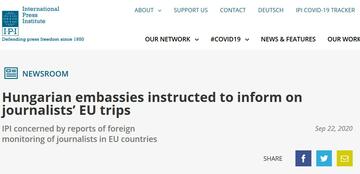
The global network of editors, media executives and leading journalists for press freedom accused the Orban government of abusing the country’s diplomatic services to inform on its own citizens, intimidate critical journalists and pressure independent media.
The news website, Telex.hu, acquired a copy of a letter sent on June 2 by the Ministry to embassies in EU member states instructing them to provide details on the activities of Hungarian journalists visiting the respective countries.
The letter signed by József Magyar, deputy under-secretary of the Ministry of Foreign Affairs, further requested details of any work and study trips and which local media they met, with replies requested within just 24 hours.
Responding to the leak, the Ministry said it did “everything necessary to avoid foreign influence in Hungarian internal matters” and blamed a network backed by the Hungarian-born liberal, billionaire philanthropist George Soros for such “attacks”.
“Instructing embassies to help monitor their country’s journalists is an abuse of diplomatic services and a new low for the Orban government”, Oliver Money-Kyrle, IPI’s Head of Europe Advocacy and Programmes, said.
“This act, and the government’s defence of it, confirms that Hungarian journalists are to be treated as enemies of the state. Embassies are to become another agent for intimidating media and closing the public’s access to news not under the direct control of the state.
“The Hungarian Minister of Foreign Affairs, Peter Szijjarto, must immediately revoke the instructions and provide full transparency over past efforts to monitor journalists abroad.”
This letter is the latest act in the government’s ongoing suppression of independent journalism in recent months.
In July, the largest and most influential of the country’s remaining independent media, Index, imploded after its then Editor-in-Chief Szabolcs Dull, was fired by the management board.
His sacking came a month after the newspaper declared that its independence was under threat from external pressure through a proposed organisational overhaul. It led to the resignation of the outlet’s entire editorial board and 50 other journalists in protest.
Two months later, the future of Hungary’s largest independent radio station Klubrádió was thrown into jeopardy after the state media regulator, controlled by Orbán’s FIDESZ party, decided not to renew its license, citing previous violations.
The rejection of the renewal application of Klubrádió means the Budapest-based commercial talk and news radio station’s license will expire on February 14, 2021, potentially forcing it off air for good. Klubrádió’s critical coverage has long made it a target of the Orbán government.
Tags: Hungary Freedom of expression Media freedom
This content is part of the Media Freedom Rapid Response (MFRR), a Europe-wide mechanism which tracks, monitors and responds to violations of press and media freedom in EU Member States and Candidate Countries. The project is co-funded by the European Commission.


